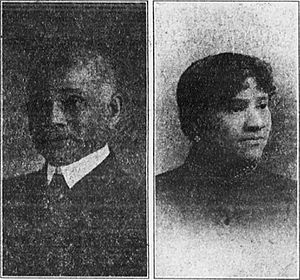J. Dallas Bowser facts for kids
Quick facts for kids
James Dallas Bowser
|
|
|---|---|

James and Dora Bowser in 1919
|
|
| Born | February 15, 1846 |
| Died | January, 1923 (aged 76) |
| Occupation | Journalist, educator |
| Political party | Republican |
James Dallas Bowser (born February 15, 1846 – died January 1923) was an important journalist and teacher in Kansas City, Missouri. He was the principal of Lincoln School and later Attucks School. Bowser was a leader in the fight for civil rights. He was famous for his poem, "Take up the Black Man's Burden," written in 1899. This poem was a response to a well-known poem by British poet Rudyard Kipling. Bowser was also part of the Citizen's League of Kansas City Inter-Racial Committee.
Contents
Early Life and Education
James Dallas Bowser was born free in Weldon, North Carolina, on February 15, 1846. His parents were also free people of color. When he was about six years old, his family moved to Chillicothe, Ohio. This town had a strong black community. His father, Henry Bowser, became one of the first black teachers there.
In the mid-1860s, Bowser moved to Kansas City. He also became a teacher there. In 1868, James Milton Turner was the principal of the Lincoln School. He left his job to become a US Minister to Liberia. Bowser was hired to take his place. He worked as principal for eleven years.
After that, he moved outside the city to Wyandotte County, Kansas. There, he became the principal of another school. In 1873, he married Dora J. Troy from Xenia, Ohio.
Political Work and Community Service
Bowser was active in Republican politics for the rest of his life. In 1881, he was given a job as a mail carrier. He held this job for four years. He lost it when a new Democratic President, Grover Cleveland, took office. Bowser was a member of the Republican State Central Committee in 1885 and 1886.
In 1887, he worked as a sealer of weights and measures in Kansas City. In the 1900s, he also worked as principal at Attucks School in Kansas City.
Starting the Gate City Press
In 1880, H. H. Johnson started a newspaper called The Free Press in Kansas City. But he could only afford to print one issue. Johnson asked Bowser for help. Bowser took over the newspaper starting with its second issue. He changed its name to the Gate City Press and became its editor.
The newspaper became very successful. It attracted many well-known writers. William Ward Yates and G. N. Gresham were associate editors. In 1886, Bowser hosted activist and journalist Ida B. Wells. She visited Kansas City for a teachers' meeting. Bowser suggested that Wells apply for a teaching job in Kansas. He also said she could write for his newspaper. Wells decided to live in Memphis instead. Bowser continued to publish the paper until 1889.
"Take up the Black Man's Burden"
In 1899, Bowser wrote a famous poem. It was a response to Rudyard Kipling's poem "The White Man's Burden". Bowser called his poem "Take up the Black Man's Burden." He wrote:
- "Take up the Black Man's burden/Send forth the best ye breed,/To judge with righteous judgement/The Black Man's work and need,//...//Let the glory of your people/Be the making of great men,/The lifting of the lowly,/To noble thought and aim."
In his poem, Bowser connected racism with imperialism. He criticized both of these ideas. He also believed that black people should work to improve themselves. This idea was also supported by Booker T. Washington. Bowser's poem is often compared to other poems written in response to Kipling. One example is "Charity Begins at Home."
Later Life and Civil Rights Work
Bowser continued to work for civil rights for African Americans. In 1920, he joined the Citizen's League of Kansas City Inter-Racial Committee. He was chosen by the NAACP and the Colored Civic League. This committee had six black members and six white members. They worked with the city to prevent racial violence. They also tried to improve housing for black people in the city.
In 1921, Bowser published another poem, "O Darkest Tulsa." This poem was about the terrible Tulsa race riot in Oklahoma. Many black people were killed, and hundreds lost their homes. The poem was published on October 1, 1921, in the Kansas City Sun. That same year, Bowser went to the NAACP national convention in Detroit.
Later in his life, Bowser was president of the Old Settlers' Association of Kansas City. He wrote and told stories about the city's history. Bowser was a member of the Presbyterian Church and a freemason. He died at his home in Kansas City in January 1923.
 | Madam C. J. Walker |
 | Janet Emerson Bashen |
 | Annie Turnbo Malone |
 | Maggie L. Walker |

